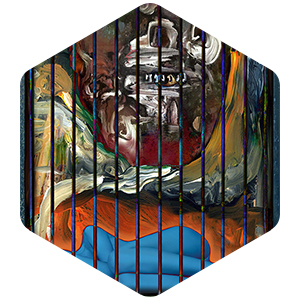TRAFFICKED -Routes to Slavery-
In the current socio-economic and cultural context, human trafficking is one of the most lucrative businesses in the world. Trafficking is a problem on a global scale. As a transnational business, it has surpassed the drug trade and moves around 7,000 million dollars per year. It is women and girls of any origin who are directly affected by this trafficking or trade to force their prostitution, exploitation or slavery. Although the most frequent form of trafficking in persons is aimed at sexual exploitation (99.7%), trafficking extends to other forms of slavery, such as forced labour, domestic servitude, child begging or organ harvesting.
Trafficking is an abuse of power over women's bodies. The networks of trafficking and prostitution, which are formed mainly by men, abuse and take advantage of the precarious conditions and poverty of people in different parts of the world, and thus, they appropriate their bodies and their lives and convert them into objects of use and enjoyment for their benefit.
Although there is an agreement signed by the United Nations in the Palermo Protocol to Prevent, Suppress and Punish Trafficking in Persons, especially Women and Children (2003), the truth is that trafficking and its consequences (prostitution and slavery) are not only challenging to address due to their extensive and complex economic networks but also due to the prevalent culture that still considers the body of a woman to be the property of men. Deception, threats, violence, rape, humiliation, and the absence of freedom... are standard tools used to subdue these women. These forms of abuse are not limited in their use to only specific individuals, but they are tools that are ubiquitous in our present sexist societies and which are taken to extremes in this context. Because the victims have become permanently socially stigmatised, very few women succeed in leaving these networks, and many fewer dare to tell what they have suffered.
We all live with human trafficking and prostitution daily, but it is a "women's problem", and very few institutions approach the issue with the required resolve and effort. As of today, only 159 countries have ratified the Palermo Protocol. Spain, which confirmed it in 2003, currently has the third highest rate of prostitution in the world, only behind Thailand and Puerto Rico. Some 45,000 women and girls are victims of trafficking in Spain, a business that moves around five million euros every day. Spanish jurisdiction focuses on the dismantling of prostitution networks in a “Comprehensive Plan” that was revised in 2015. It provides comprehensive assistance to victims, but reality shows that this is not nearly enough due to the complexity of the problem and the few resources available.
To effectively intervene in the trafficking trade and reach these women and girls, we must target diverse social strata. The Palermo Protocol addresses three areas: Prevent trafficking, Punish traffickers and Protect victims. As an association of artists sensitised to the abuses and violence suffered by women, we feel the need to carry out an educational effort to raise awareness and denounce a problem which strips away the dignity of thousands of women and normalises the idea that women's bodies can be used and abused with impunity.
Our project is a work of denunciation and reflection on the myriad forms of humiliation and violence which trafficked women are subjected to. We understand that it is a cultural problem that concerns us all because it relates to such vital issues as personal freedom and respect for the lives of all women.
Through various artistic disciplines (photography, video, painting, sculpture, etc.), the artists of EmPoderArte will develop a collective artistic itinerary with this subject as the theme. In it, the reflection will focus not only on the consequences of human trafficking but also on the causes and ways to eradicate it.
Thank you for visiting!
Copyright © 2026 Helena Revuelta - All Rights Reserved.






